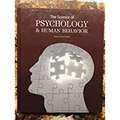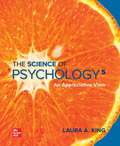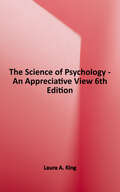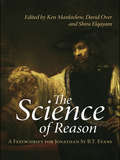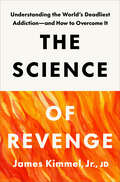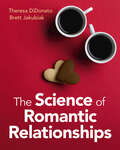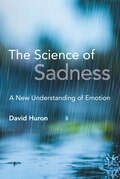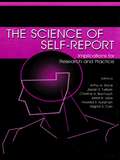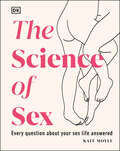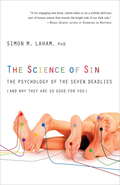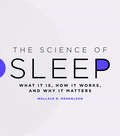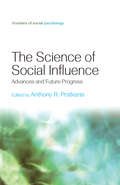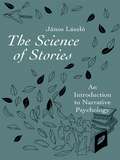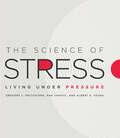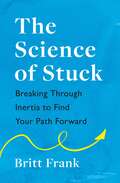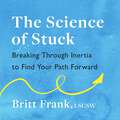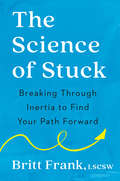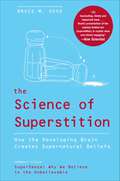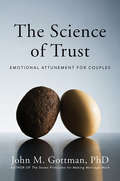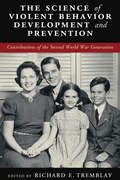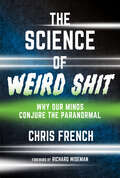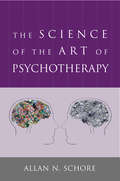- Table View
- List View
The Science of Psychology (Third Edition)
by Laura A. KingFocusing on why things go right, The Science of Psychology: An Appreciative View, Third Edition, helps students understand and appreciate psychology as a science and as an integrated whole. The third edition's program extends the themes and enhances the pedagogical value by guiding students toward topics they find the most challenging and then offering new learning resources to help students master them.
The Science of Psychology and Human Behavior Sixth Custom Edition
by Carole WadeAn introductory psychology textbook for college students.
The Science of Psychology: An Appreciative View
by Laura A. KingThis book communicates the nature and breadth of psychology -and its value as a science - with an emphasis on why things go right. With primary goals of teaching students to think like psychological scientists and focusing on the understanding of human strengths and capacities, health, and wellness, the book cultivates students’ appreciation for how extensively psychology applies to their lives.
The Science of Psychology: An Appreciative View (AP Science of Psychology Ser.)
by Laura A. KingNIMAC-sourced textbook
The Science of Psychology: An Appreciative View, 6th Edition
by Laura A. KingFocusing on why things go right, The Science of Psychology: An Appreciative View helps students understand and appreciate psychology as a science and as an integrated whole. Informed by student data, the program extends these themes and enhances their pedagogical value by helping students through topics they find the most challenging and offering learning resources to master them. With a deep integration of cultural diversity, the text offers a “Guide to Diversity, Equity, and Inclusion” in the Preface, providing a chapter-by-chapter list of topics involving DEI issues and research. When paired with Connect, students will also benefit from Thematic Relevancy Modules (brief, thought-provoking modules tied to the APA's IPI Student Learning Outcomes), Interactivities and Application-Based-Activities, Psych-at-Work videos (interviews with real people), the new and unique Immersive Brain, and more innovative resources to help further prepare them to be successful in this course.
The Science of Reason: A Festschrift for Jonathan St B.T. Evans (Psychology Press Festschrift Series)
by Ken ManktelowThis volume is a state-of-the-art survey of the psychology of reasoning, based around, and in tribute to, one of the field’s most eminent figures: Jonathan St B.T. Evans. In this collection of cutting edge research, Evans’ collaborators and colleagues review a wide range of important and developing areas of inquiry. These include biases in thinking, probabilistic and causal reasoning, people’s use of ‘if’ sentences in arguments, the dual-process theory of thought, and the nature of human rationality. These foundational issues are examined from various angles and finally integrated in a concluding panoramic chapter written by Evans himself. The eighteen chapters, all written by leading international researchers, combine state-of the-art research with investigation into the most fundamental questions surrounding human mental life, such as: What is the architecture of the human mind? Are humans rational, and what is the nature of this rationality? How do we think hypothetically? The Science of Reason offers a unique combination of breadth, depth and integrative vision, making it an indispensable resource for researchers and students of human reason.
The Science of Revenge: Understanding the World's Deadliest Addiction--and How to Overcome It
by James Kimmel Jr., JDIn this definitive book on revenge, psychiatry researcher James Kimmel, Jr. exposes the unseen neurobiological cause of violence—a compulsive desire for retribution—and offers a profound new understanding of human behavior and breakthrough framework for making our lives and communities safer.&“This riveting, science-based exploration of why we feel pleasure from other people&’s pain is a must-read.&”—Anna Lembke, MD, author of Dopamine NationA Next Big Idea Club Must-ReadThere is a hidden addiction plaguing humanity right now: revenge. Researchers have identified retaliation in response to real and imagined grievances as the root cause of most forms of human aggression and violence. From vicious tweets to road rage, murder-suicide, and armed insurrection, perpetrators almost always see themselves as victims seeking justice. Chillingly, recent behavioral and neuroimaging studies of the human brain show that harboring a personal grievance triggers revenge desires and activates the neural pleasure and reward circuitry of addiction.Although this behavior is ancient and seems inevitable, by understanding retaliation and violence as an addictive brain-biological process, we can control deadly revenge cravings and save lives. In The Science of Revenge, Yale violence researcher and psychiatry lecturer James Kimmel, Jr., JD, uncovers the truth behind why we want to hurt the people who hurt us, what happens when it gets out of hand, and how to stop it.Weaving neuroscience, psychology, sociology, law, and human history with captivating storytelling, Dr. Kimmel reveals the neurological mechanisms and prevalence of revenge addiction. He shines an unsparing light on humanity&’s pathological obsession with revenge throughout history; his own struggle with revenge addiction that almost led him to commit a mass shooting; America&’s growing addiction to revenge as a special brand of justice; and the startlingly similar addictive behaviors and motivations of childhood bullies, abusive partners, aggrieved employees, sparring politicians, street gang members, violent extremists, mass killers, and tyrannical dictators. He also reveals the amazing, healing changes that take place inside your brain and body when you practice forgiveness. Emphasizing the necessity of proven public health approaches and personal solutions for every level of revenge addiction, he offers urgent, actionable information and novel methods for preventing and treating violence.
The Science of Romantic Relationships
by Theresa DiDonato Brett JakubiakWhy do people fall in love? Does passion fade with time? What makes for a happy, healthy relationship? This introduction to relationship science follows the lifecycle of a relationship – from attraction and initiation, to the hard work of relationship maintenance, to dissolution and ways to strengthen a relationship. Designed for advanced undergraduates studying psychology, communication or family studies, this textbook presents a fresh, diversity-infused approach to relationship science. It includes real-world examples and critical-thinking questions, callout boxes that challenge students to make connections, and researcher interviews that showcase the many career paths of relationship scientists. Article Spotlights reveal cutting-edge methods, while Diversity and Inclusion boxes celebrate the variety found in human love and connection. Throughout the book, students see the application of theory and come to recognize universal themes in relationships as well as the nuances of many findings. Instructors can access lecture slides, an instructor manual, and test banks.
The Science of Sadness: A New Understanding of Emotion
by David HuronAn accessible, scientific account of grief, melancholy, and nostalgia in human life and their broader lessons for understanding emotions in general.The Science of Sadness proposes an original scientific account of grief, melancholy, and nostalgia, advocating a unique ethological approach to these familiar, woeful emotions. One of the leading scholars in the psychology of music and music cognition, David Huron draws on hundreds of studies from physiology, medicine, neuroscience, psychology, anthropology, and the arts to resolve long-standing problems that have stymied modern emotion research. A careful examination of sadness-related behaviors reveals their biological and social functions, which Huron uses to formulate a new theory about how emotions in general are displayed and interpreted.We&’ve all shed tears of joy, tears of grief, tears of pain. While different emotions often share the same weepy display, Huron identifies the single function that unites them. He suggests how weeping emerged over the course of human evolution, explores the contrasting cultural manifestations of sadness, and chronicles humanity&’s changing interpretations of sadness over time. Huron also explains the various ways cultures recruit and reshape involuntary emotional displays for different social purposes, and he offers a compelling narrative of what makes tragic arts so appealing. Though sadness is typically regarded as the very antithesis of happiness, The Science of Sadness draws attention to the important roles that grief, melancholy, and nostalgia play in human well-being.
The Science of Self-Control
by Howard RachlinThis book proposes a new science of self-control based on the principles of behavioral psychology and economics. Claiming that insight and self-knowledge are insufficient for controlling one's behavior, Howard Rachlin argues that the only way to achieve such control--and ultimately happiness--is through the development of harmonious patterns of behavior. Most personal problems with self-control arise because people have difficulty delaying immediate gratification for a better future reward. The alcoholic prefers to drink now. If she is feeling good, a drink will make her feel better. If she is feeling bad, a drink will make her feel better. The problem is that drinking will eventually make her feel worse. This sequence--the consistent choice of a highly valued particular act (such as having a drink or a smoke) that leads to a low-valued pattern of acts--is called "the primrose path." To avoid it, the author presents a strategy of "soft commitment," consisting of the development of valuable patterns of behavior that bridge over individual temptations. He also proposes, from economics, the concept of the substitutability of "positive addictions," such as social activity or exercise, for "negative addictions," such as drug abuse or overeating. Self-control may be seen as the interaction with one's own future self. Howard Rachlin shows that indeed the value of the whole--of one's whole life--is far greater than the sum of the values of its individual parts.
The Science of Self-report: Implications for Research and Practice
by Arthur A. Stone Christine A. Bachrach Jaylan S. Turkkan Jared B. Jobe Howard S. Kurtzman Virginia S. CainRigorous methodological techniques have been developed in the last decade to improve the reliability and accuracy of self reports from research volunteers and patients about their pain, mood, substance abuse history, or dietary habits. This book presents cutting-edge research on optimal methods for obtaining self-reported information for use in the evaluation of scientific hypothesis, in therapeutic interventions, and in the development of prognostic indicators. ALTERNATE BLURB: Self-reports constitute critically important data for research and practice in many fields. As the chapters in this volume document, psychological and social processes influence the storage and recall of self-report information. There are conditions under which self-reports should be readily accepted by the clinician or researcher, and other conditions where healthy scepticism is required. The chapters demonstrate methods for improving the accuracy of self-reports, ranging from fine-tuning interviews and questionnaires to employing emerging technologies to collect data in ways that minimize bias and encourage accurate reporting. Representing a diverse group of disciplines including sociology, law, psychology, and medicine, the distinguished authors offer crucial food for thought to all those whose work depends on the accurate self-reports of others.
The Science of Sex: Every Question About Your Sex Life Answered
by Kate MoyleAn engaging manual exploring the many scientific, practical, and emotional aspects of pleasure, for you and your partner(s)An empowering reeducation to fix our broken sexual culture.Dispelling the myth that everyone else is having &“perfect sex,&” or even that there is such a thing, this book explores taboos, debunks myths, and brings together the latest research to a topic that has preoccupied the vast majority for millennia. Reframing assumptions about sex and moving away from a shame-based approach to a pleasure-focused, biopsychosocial one, Kate Moyle, a certified psycho-sexologist and relationship therapist, aims to encourage curiosity and pleasure, open a variety of perspectives and voices, build awareness and discovery, and enable readers to think about sex holistically. With a question-and-answer format directly addressing the reader, you can discover the sex you like having and move to a place of more acceptance, less judgment, and the freedom to be curious. Up to date and inclusive of all genders, bodies, and sexualities, this is a sex re-education, empowering you to explore your preferences, expand your horizons, and maximize you and your partner(s) potential for rewarding, and intimate sex.
The Science of Sin
by Simon M. LahamPride, lust, gluttony, greed, envy, sloth, and anger.They're considered "deadly" because of their capacity to generate other evils. The truth is, we all sin and we do it all the time--in fact, usually several times over before breakfast! But human behavior, argues social psychologist Simon Laham, is more complex than "good" or "evil." In psychology, these sins aren't considered morally wrong or even uniformly bad, but are treated rather as complex and interesting psychological states that if, indulged wisely, can be functional, adaptive, and lead to a range of positive effects. The Science of Sin takes on these so-called sins one by one and through psychological research shows that being bad can be oh-so-good for you. Did you know that: · Being slow and lazy can help you win the race? · Anger makes you more open-minded? · Coveting what others have not only makes you more creative but bolsters self- esteem? So go ahead, eat that last cookie and kick back on the couch for a day of TV with your neighbor's boyfriend--from gluttony to greed, envy to lust, Laham shows how even the deadliest, most decadent of vices can make you smart, successful, and happy.
The Science of Sleep: What It Is, How It Works, and Why It Matters
by Wallace B. MendelsonWe often hear that humans spend one third of their lives sleeping—and most of us would up that fraction if we could. Whether we’re curling up for a brief lunchtime catnap, catching a doze on a sunny afternoon, or clocking our solid eight hours at night, sleeping is normally a reliable way to rest our heads and recharge our minds. And our bodies demand it: without sufficient sleep, we experience changes in mood, memory loss, and difficulty concentrating. Symptoms of sleep deprivation can be severe, and we know that sleep is essential for restoring and rejuvenating muscles, tissue, and energy. And yet, although science is making remarkable inroads into the workings and functions of sleep, many aspects still remain a mystery. In The Science of Sleep, sleep expert Wallace B. Mendelson explains the elements of human sleep states and explores the variety of sleep disorders afflicting thousands of people worldwide. Mendelson lays out the various treatments that are available today and provides a helpful guide for one of life’s most important activities. By offering the first scientific yet accessible account of sleep science, Mendelson allows readers to assess their personal relationships with sleep and craft their own individual approaches to a comfortable and effective night’s rest. Addressing one of the major public health issues of the day with cutting-edge research and empathetic understanding, The Science of Sleep is the definitive illustrated reference guide to sleep science.
The Science of Social Influence: Advances and Future Progress (Frontiers of Social Psychology)
by Anthony R. PratkanisThe contributions to this volume capture the thrill of current work on social influence, as well as providing a tutorial on the scientific and technical aspects of this research. The volume teaches the student to: Learn how to conduct lab, field and case research on social influence through example by leading researchers Find out about the latest discoveries including the status of research on social influence tactics, dissonance theory, conformity, and resistance to influence Discover how seemingly complex issues such as power, rumors, group and minority influence and norms can be investigated using the scientific method Apply knowledge to current influence campaigns to find out what works and what does not. The Science of Social Influence is the perfect core or complementary text for advanced undergraduate or graduate students in courses such as Attitudes and Attitude Change, Communications, Research Methods and, of course, Social Influence.
The Science of Stories: An Introduction to Narrative Psychology
by János LászlóThe Science of Stories explores the role narrative plays in human life. Supported by in-depth research, the book demonstrates how the ways in which people tell their stories can be indicative of how they construct their worlds and their own identities. Based on linguistic analysis and computer technology, Laszlo offers an innovative methodology which aims to uncover underlying psychological processes in narrative texts. The reader is presented with a theoretical framework along with a series of studies which explore the way a systematic linguistic analysis of narrative discourse can lead to a scientific study of identity construction, both individual and group. The book gives a critical overview of earlier narrative theories and summarizes previous scientific attempts to uncover relationships between language and personality. It also deals with social memory and group identity: various narrative forms of historical representations (history books, folk narratives, historical novels) are analyzed as to how they construct the past of a nation. The Science of Stories is the first book to build a bridge between scientific and hermeneutic studies of narratives. As such, it will be of great interest to a diverse spectrum of readers in social science and the liberal arts, including those in the fields of cognitive science, social psychology, linguistics, philosophy, literary studies and history.
The Science of Stress: Living Under Pressure
by Gregory L. Fricchione, Ana Ivkovic, Albert Yeung&“A comprehensive examination of stress&” from three prominent neuropsychiatrists (The Boston Globe). Jobs and families. Deluges of digital communication. The constant demands on our time and money. The screaming match of politics and the threat of terrorism and war. There&’s no doubt we&’re stressed out—but what exactly is it doing to us? Neuropsychiatrists Gregory L. Fricchione, Ana Ivkovic, and Albert Yeung gently remind us in this book that persistent stress is directly linked to chronic ailments like heart disease, diabetes, and depression, contributing to one of the biggest health challenges facing the world in the twenty-first century. As they show, alleviating stress is a task no one physician can accomplish. It&’s not the sort of problem a surgeon can excise with a scalpel or an internist can eradicate with antibiotics. It requires everyone&’s efforts—the healthy, the sick, doctors, nurses, psychologists, clergy, community leaders, and beyond—to pull together to address the stress-induced drivers in our world that undermine our health. Clearly and accessibly exploring the latest in modern neuroscience and immunology, the authors examine what those drivers are and how they reduce the body&’s metabolic reserve, making us more vulnerable to illness. They then look at the antidote: enhanced resilience, something we can achieve by intelligently adjusting how we face the significant adversities that can spring up in so many facets of our lives. With innumerable insights on the personal and social causes of stress and its physiological effects, this book serves as an essential guide to properly taking care of ourselves.
The Science of Stuck
by Britt FrankWe all experience stuckness in our lives. We feel stuck in our relationships, career paths, body struggles, addiction issues, and more. Many of us know what we need to do to move forward--but find ourselves unable to take the leap to make it happen. And then we blame and shame ourselves, and stay in a loop of self-doubt that goes nowhere.The good news is you're not lazy, crazy, or unmotivated. In this empowering and action-oriented guide, you'll discover why we can't think our way forward--and how to break through what's holding us back. Using an eclectic approach and a customizable plan that's as direct or as deep as you want, this life-changing guide empowers you to:- break old habits and patterns- gain perspective on pain and trauma from the past- free yourself from the torturous "why" questions- take control of your choices to create the life you wantBringing together research-backed solutions that range from shadow work to reparenting, embodied healing, and other clinical practices, along with empowering personal stories, this book is a hands-on road map for moving forward with purpose, confidence, and the freedom to become who you're truly meant to be.
The Science of Stuck: Breaking Through Inertia to Find Your Path Forward
by Britt FrankWe all experience stuckness in our lives. We feel stuck in our relationships, career paths, body struggles, addiction issues, and more. Many of us know what we need to do to move forward--but find ourselves unable to take the leap to make it happen. And then we blame and shame ourselves, and stay in a loop of self-doubt that goes nowhere.The good news is you're not lazy, crazy, or unmotivated. In this empowering and action-oriented guide, you'll discover why we can't think our way forward--and how to break through what's holding us back. Using an eclectic approach and a customizable plan that's as direct or as deep as you want, this life-changing guide empowers you to:- break old habits and patterns- gain perspective on pain and trauma from the past- free yourself from the torturous "why" questions- take control of your choices to create the life you wantBringing together research-backed solutions that range from shadow work to reparenting, embodied healing, and other clinical practices, along with empowering personal stories, this audiobook is a hands-on road map for moving forward with purpose, confidence, and the freedom to become who you're truly meant to be.(P) 2022 Penguin Audio
The Science of Stuck: Breaking Through Inertia to Find Your Path Forward
by Britt FrankA research-based tool kit for moving past what&’s holding you back—in life, in love, and in work.We all experience stuckness in our lives. We feel stuck in our relationships, career paths, body struggles, addiction issues, and more. Many of us know what we need to do to move forward—but find ourselves unable to take the leap to make it happen. And then we blame and shame ourselves, and stay in a loop of self-doubt that goes nowhere. The good news is you&’re not lazy, crazy, or unmotivated. In this empowering and action-oriented guide, you&’ll discover why we can&’t think our way forward—and how to break through what&’s holding us back. Using an eclectic approach and a customizable plan that&’s as direct or as deep as you want, this life-changing guide empowers you to: break old habits and patternsgain perspective on pain and trauma from the pastfree yourself from the torturous &“why&” questionstake control of your choices to create the life you want Bringing together research-backed solutions that range from shadow work to reparenting, embodied healing, and other clinical practices, along with empowering personal stories, this book is a hands-on road map for moving forward with purpose, confidence, and the freedom to become who you&’re truly meant to be.
The Science of Superstition: How the Developing Brain Creates Supernatural Beliefs
by Bruce M. HoodIn The Science of Superstition, cognitive psychologist Bruce Hood examines the ways in which humans understand the supernatural, revealing what makes us believe in the unbelievable.*Previously published as SuperSense.
The Science of Trust: Emotional Attunement For Couples (Playaway Adult Nonfiction Ser.)
by John M. GottmanAn eminent therapist explains what makes couples compatible and how to sustain a happy marriage. For the past thirty-five years, John Gottman's research has been internationally recognized for its unprecedented ability to precisely measure interactive processes in couples and to predict the long-term success or failure of relationships. In this groundbreaking book, he presents a new approach to understanding and changing couples: a fundamental social skill called "emotional attunement," which describes a couple's ability to fully process and move on from negative emotional events, ultimately creating a stronger relationship. Gottman draws from this longitudinal research and theory to show how emotional attunement can downregulate negative affect, help couples focus on positive traits and memories, and even help prevent domestic violence. He offers a detailed intervention devised to cultivate attunement, thereby helping couples connect, respect, and show affection. Emotional attunement is extended to tackle the subjects of flooding, the story we tell ourselves about our relationship, conflict, personality, changing relationships, and gender. Gottman also explains how to create emotional attunement when it is missing, to lay a foundation that will carry the relationship through difficult times. Gottman encourages couples to cultivate attunement through awareness, tolerance, understanding, non-defensive listening, and empathy. These qualities, he argues, inspire confidence in couples, and the sense that despite the inevitable struggles, the relationship is enduring and resilient. This book, an essential follow-up to his 1999 The Marriage Clinic, offers therapists, students, and researchers detailed intervention for working with couples, and offers couples a roadmap to a stronger future together.
The Science of Violent Behavior Development and Prevention: Contributions of the Second World War Generation
by Richard E. TremblayThis book describes the lives of 12 people born in Europe and North America during the Second World War. They became leading scholars on the development and prevention of violent human behavior. From the first to the last page, the book introduces contrasting life-stories and shows how their paths crossed to create a relatively unified body of knowledge on how human violence develops and possible prevention methods. The authors describe the similarities and differences in their family background, university training, theories, and collaborations. Not to mention how they differ in research methods, scientific conclusions, and their influence on the research published today. These comparisons celebrates the diversity of their experience and, in turn, their achievements. By knowing this, you can stand on the shoulders of these giants to look to the future of this subject and potentially contribute to its next steps.
The Science of Weird Shit: Why Our Minds Conjure the Paranormal
by Chris FrenchAn accessible and gratifying introduction to the world of paranormal beliefs and bizarre experiences.Ghostly encounters, alien abduction, reincarnation, talking to the dead, UFO sightings, inexplicable coincidences, out-of-body and near-death experiences. Are these legitimate phenomena? If not, then how should we go about understanding them? In this fascinating book, Chris French investigates paranormal claims to discover what lurks behind this &“weird shit.&” French provides authoritative evidence-based explanations for a wide range of superficially mysterious phenomena, and then goes further to draw out lessons with wider applications to many other aspects of modern society where critical thinking is urgently needed.Using academic, comprehensive, logical, and, at times, mathematical approaches, The Science of Weird Shit convincingly debunks ESP, communicating with the dead, and alien abduction claims, among other phenomena. All the while, however, French maintains that our belief in such phenomena is neither ridiculous nor trivial; if anything, such claims can tell us a great deal about the human mind if we pay them the attention they are due. Filled with light-bulb moments and a healthy dose of levity, The Science of Weird Shit is a clever, memorable, and gratifying read you won&’t soon forget.
The Science of the Art of Psychotherapy (Norton Series on Interpersonal Neurobiology)
by Allan N. SchoreThe latest work from a pioneer in the study of the development of the self. Focusing on the hottest topics in psychotherapy--attachment, developmental neuroscience, trauma, the developing brain--this book provides a window into the ideas of one of the best-known writers on these topics. Following Allan Schore's very successful books on affect regulation and dysregulation, also published by Norton, this is the third volume of the trilogy. It offers a representative collection of essential expansions and elaborations of regulation theory, all written since 2005. As in the first two volumes of this series, each chapter represents a further development of the theory at a particular point in time, presented in chronological order. Some of the earlier chapters have been re-edited: those more recent contain a good deal of new material that has not been previously published. The first part of the book, Affect Regulation Therapy and Clinical Neuropsychoanalysis, contains chapters on the art of the craft, offering interpersonal neurobiological models of the change mechanism in the treatment of all patients, but especially in patients with a history of early relational trauma. These chapters contain contributions on "modern attachment theory" and its focus on the essential nonverbal, unconscious affective mechanisms that lie beneath the words of the patient and therapist; on clinical neuropsychoanalytic models of working with relational trauma and pathological dissociation: and on the use of affect regulation therapy (ART) in the emotionally stressful, heightened affective moments of clinical enactments. The chapters in the second part of the book on Developmental Affective Neuroscience and Developmental Neuropsychiatry address the science that underlies regulation theory's clinical models of development and psychopathogenesis. Although most mental health practitioners are actively involved in child, adolescent, and adult psychotherapeutic treatment, a major theme of the latter chapters is that the field now needs to more seriously attend to the problem of early intervention and prevention. Praise for Allan N. Schore: "Allan Schore reveals himself as a polymath, the depth and breadth of whose reading-bringing together neurobiology, developmental neurochemistry, behavioral neurology, evolutionary biology, developmental psychoanalysis, and infant psychiatry-is staggering." -British Journal of Psychiatry "Allan Schore's...work is leading to an integrated evidence-based dynamic theory of human development that will engender a rapproachement between psychiatry and neural sciences."-American Journal of Psychiatry "One cannot over-emphasize the significance of Schore's monumental creative labor...Oliver Sacks' work has made a great deal of difference to neurology, but Schore's is perhaps even more revolutionary and pivotal...His labors are Darwinian in scope and import."-Contemporary Psychoanalysis "Schore's model explicates in exemplary detail the precise mechanisms in which the infant brain might internalize and structuralize the affect-regulating functions of the mother, in circumscribed neural tissues, at specifiable points in it epigenetic history." -Journal of the American Psychoanalytic "Allan Schore has become a heroic figure among many psychotherapists for his massive reviews of neuroscience that center on the patient-therapist relationship." -Daniel Goleman, author of Social Intelligence

